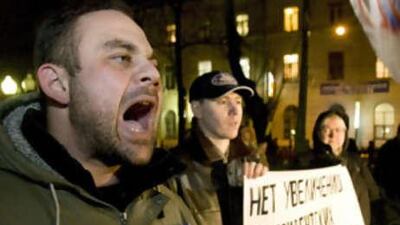MOSCOW // The speed with which a bill to increase the presidential term to six years moved through the State Duma last week has prompted speculation that Dmitry Medvedev, the Russian president, could step down before the end of his term, allowing the enormously popular Vladimir Putin to return. Russia's lower house of parliament passed the proposed constitutional amendment in a first reading on Friday by a vote of 388-58. The legislation will face two more readings this week as lawmakers fast-track the amendment. If passed, it could pave the way for Mr Putin's return to the presidency for 12 more years. Mr Medvedev and Mr Putin have ruled the country as a tandem since Mr Medvedev formally took office in May. But even before Mr Putin hand-picked Mr Medvedev as his preferred candidate in the March presidential election, speculation swirled that Mr Putin could select a successor specifically to have him step down and clear the way for his return to the Kremlin. The Russian constitution barred Mr Putin only from running for a third "consecutive" term, leaving open the possibility he could run in a future election. Mr Medvedev danced around a question about his possible early departure in an interview published last week in Le Figaro, a French daily newspaper, saying only that the amendment would only apply to his successor. "I am in the process of working right now," Mr Medvedev said in the interview published on Thursday. "Why are you pushing me into certain decisions? I can say only one thing for sure and that is that the new terms will benefit only whoever is elected to the office of president once the necessary amendments have entered into force." Mr Medvedev first suggested extending the presidential term from four years to six years in his state of the nation address on Nov 5. Less than a week later he submitted it to the lower house of parliament for consideration. Mr Putin, who leads the United Russia Party, which has a constitutional majority in the Russian parliament, gave his public backing to the bill on Wednesday. "I support Dmitry Medvedev's proposal," he told reporters in Moscow. "As far as who can run for the next term and when, it is premature to talk about this." The Duma is expected to pass the bill in two more readings this week. After that it will have to be passed with a three-fourths majority in the upper house of parliament and two-thirds of Russia's regional parliaments before being sent to the president to be signed into law. With the backing of Mr Medvedev and, perhaps more importantly of Mr Putin, it is not a question of whether the amendment will be enacted, only when. Before the March election Mr Putin repeatedly said he would not change the constitution to stay on for a third term despite 70 per cent approval ratings, thanks in large part to Russia's economic boom and the Kremlin's tight control over the television airwaves. Mr Medvedev, however, made no such public pronouncements either before or after the election, which he won in a landslide as Mr Putin's chosen successor. Under Russian law, should Mr Medvedev step down or in any way be unable to fulfil his duties as president, Mr Putin, as prime minister, would take his place and be required to call a presidential election within three months. Should Mr Putin run in such an election he would be all but guaranteed to win. This is the exact scenario in which Mr Putin became president in 1999 after Boris Yeltsin, who was ailing, handed him the reins to the country. Senior Russian officials played down the possibility of new elections last week although, like Mr Putin and Mr Medvedev, they did not expressly state that the current president would serve out his term. "Everyone who is elected should serve out his term," Boris Gryzlov, the Russian parliamentary speaker, told reporters after Friday's vote. Oleg Morozov, the deputy parliamentary speaker, said he could "not exclude" the possibility of early elections. "Snap presidential and parliamentary elections are regulated by the current law and such a possibility always exists," Mr Morozov was quoted as saying by the state-run Interfax news agency. "But if you want my personal opinion, I don't see any reason today for holding such elections." The Communist Party, which has 57 seats in Russia's lower house of parliament, led the opposition to the bill, but with United Russia's majority, the Communists could not block passage of the amendment. The Communists portray themselves as the only real opposition party in the State Duma and while the party does criticise Kremlin policies to appeal to its base, it rarely criticises Mr Putin or Mr Medvedev directly. Gennady Zyuganov, the Communist Party leader, on Friday described the amendment, which would be the first to the Russian constitution, as "the work of the devil". "First of all, the powers that be understand that it will be difficult to submit such proposals six months from now," Mr Zyuganov said in a statement. "The economic situation is getting worse. Secondly, they will have to give an answer for why the second huge crisis in 10 years is happening. That is why they are rushing." In a telephone interview after Friday's vote, Sergei Markov, a Russian MP and political analyst with connections to the Kremlin, dismissed suggestions the bill was being rushed. He said it was a logical response to "outside pressure". Mr Markov, a member of Mr Putin's United Russia party, said an unsuccessful attempt by neighbouring Georgia to retake its breakaway South Ossetia region by force last summer and the global financial crisis, which he blamed on the United States, make it "necessary to strengthen the country's most powerful office". cschreck@thenational.ae

Bill could lead to Putin returning as president
Speculation has Dmitry Medvedev stepping down before the end of his term, paving the way for Vladinmir Putin's return.
Most popular today
5
